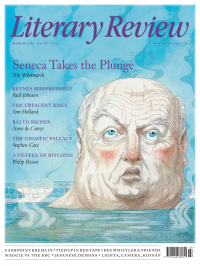Jeremy Lewis
Queen of the Slush Pile
Loose Connections: From Narva Maantee to Great Russell Street
By Esther Menell
Westhill Books 280pp £13.95
When I started work in the late Sixties, literary publishing depended to an extraordinary extent on an army of highly literate women, mostly middle-aged, usually unmarried and always extremely badly paid, who would struggle home every evening and weekend heavily laden with typescripts and proofs to be edited and corrected in their spare time; and on a group of enterprising Jewish émigré publishers who had revitalised the trade immediately after the war. Both groups are integral to Loose Connections, a subtle interlacing of family and professional life.
It takes time to adjust to this book, which darts confusingly between the distant and recent past, family history and publishing life, but persistence pays off. Esther Menell’s parents were Estonian Jews. Her grandfather had pioneered the extraction of oil from shale gas, and other members of the family inherited his entrepreneurial flair. She was born in London in 1934, but spent her early years in Tallinn. Against her mother’s wishes, her father was persuaded to return to London in 1939. Those members of the family who remained behind were murdered by the Nazis. ‘Beside these lives and deaths, the goings-on in a publisher’s office are paltry stuff indeed,’ she writes, ‘but I have only my own life to tell.’
Following boarding school and Oxford she decided to try her luck in publishing. After working for Methuen and Anthony Blond – the publisher she remembers most fondly – she came to rest at André Deutsch, where she remained for some thirty years. Deutsch, who gave his name to the company he founded, was small, energetic, notoriously penny-pinching and equipped with a thick Hungarian accent. His co-directors, Diana Athill and Nicolas Bentley, provided the editorial authority that complemented his entrepreneurial flair. Their list included Norman Mailer, Philip Roth, Brian Moore, Mordecai Richler, Laurie Lee, John Updike and Roy Fuller.
I first met Esther Whitby, as she then was, in 1968, when I went to work at Deutsch. ‘The Queen of the Slush Pile’, as she calls herself, she worked in a gloomy basement that reeked of gas. An old-fashioned ‘hands-on’ editor, she kept a low profile, was paid peanuts and dutifully did her reading at home on the grounds that it was ‘as vital to the life of publishing and as unremitting as housework and housekeeping are to daily life’. But she gradually began to build up her own list of authors. She was sent to Devon to meet Jean Rhys. Athill warned her that Rhys ‘couldn’t type, had got stuck with her novel and drank too much’, but the novel that eventually emerged was The Wide Sargasso Sea. Athill later ‘pulled rank’ as a director and appropriated Molly Keane’s Good Behaviour, which the author’s agent had submitted to Menell. A shared pleasure in books and gossip ‘re-established the friendship, but it was never quite what it had been’.
All self-respecting publishers have a list of masterpieces or bestsellers that they have rejected, and Deutsch was no exception. The firm published Edmund White’s first two books, but not the book which made his name, A Boy’s Own Story. As Menell explains:
when I eventually got the manuscript home – it had fallen off the back of my bicycle in Camden High Street – and sat down to read it, it fell far short of expectations. It was certainly good enough to publish but compared with the earlier books this was dull stuff: I had been White’s most vociferous and only champion (indulged by André because his earlier books had been cheap to buy in) but I couldn’t fight his corner on this one and we let it go.

Sign Up to our newsletter
Receive free articles, highlights from the archive, news, details of prizes, and much more.@Lit_Review
Follow Literary Review on Twitter
Twitter Feed
Under its longest-serving editor, Graydon Carter, Vanity Fair was that rare thing – a New York society magazine that published serious journalism.
@PeterPeteryork looks at what Carter got right.
Peter York - Deluxe Editions
Peter York: Deluxe Editions - When the Going Was Good: An Editor’s Adventures During the Last Golden Age of Magazines by Graydon Carter
literaryreview.co.uk
Henry James returned to America in 1904 with three objectives: to see his brother William, to deliver a series of lectures on Balzac, and to gather material for a pair of books about modern America.
Peter Rose follows James out west.
Peter Rose - The Restless Analyst
Peter Rose: The Restless Analyst - Henry James Comes Home: Rediscovering America in the Gilded Age by Peter Brooks...
literaryreview.co.uk
Vladimir Putin served his apprenticeship in the KGB toward the end of the Cold War, a period during which Western societies were infiltrated by so-called 'illegals'.
Piers Brendon examines how the culture of Soviet spycraft shaped his thinking.
Piers Brendon - Tinker, Tailor, Sleeper, Troll
Piers Brendon: Tinker, Tailor, Sleeper, Troll - The Illegals: Russia’s Most Audacious Spies and the Plot to Infiltrate the West by Shaun Walker
literaryreview.co.uk